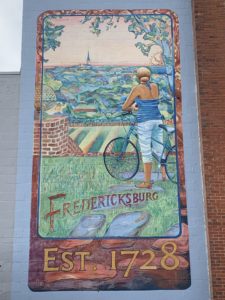From UMW:
Most children learn how to ride a bike around the same time they lose their first tooth. For Olivia Mason-Lucas, the memory is more recent. She first got on two wheels at age 15, when her father taught her to ride so she could visit a friend.

“I still remember feeling nervous because the parking lot was uneven,” said Mason-Lucas, now a senior international affairs major at the University of Mary Washington. “But once I finally got the hang of it, it was really liberating.”
These days, Mason-Lucas borrows friends’ bicycles to get around campus and downtown and knows the challenge of finding a safe place to park a bike. She’s among a group of UMW students working to make the City of Fredericksburg more accessible for area cyclists through Bike FXBG, a collaboration between UMW’s Social Good Lab and Fredericksburg Main Street. This semester, they’ve surveyed local residents and small business owners about plans to install bike racks, shelters and corrals around town. Their efforts will not only make a positive environmental and economic impact on the community, but also give the students consulting skills that will benefit them in their future careers.
“With its team-based approach, project-specific focus and design sprint mindset, the Social Good Lab gives students the opportunity to apply design thinking to a real-world problem,” said Associate Professor of Economics Shawn Humphrey, who teaches the experiential learning course, now in its second year.
Their partner for the semester, Fredericksburg Main Street, was awarded a $25,000 downtown investment grant from Virginia Main Street for a beautification project, which will pay for the bike infrastructure, as well as planters, benches and trash cans. An in-kind installation from the city and donations from a recent social media fundraiser will fill in the gap for the project, which will total $38,000.
The goal is to preserve the city’s rich history and culture, while also creating a more vibrant economic future for downtown businesses, said Fredericksburg Main Street Executive Director Ann Glave.
Introducing a bike infrastructure goes “hand-in-hand” with Fredericksburg’s interest in sustainability, said Glave, citing the city’s recent resolution to commit to 100 percent clean, renewable energy by 2050. Furthermore, it addresses a growing need in the community for more bicycle storage space, she added. “Look around right now and you’ll see bikes attached to trees and traffic signs and laying on the ground.”
After researching bike accessible cities like Portland, Oregon and Chapel Hill, North Carolina, UMW students designed a short survey for Fredericksburg area residents. More than 200 community members have responded, with many selecting Riverfront Park, the train station, and storefronts and restaurants as desired locations for bike racks, shelters and corrals.

Surveys were also submitted by small business owners, who stand to benefit considerably from having more bicycle structures near their establishments. Shoppers arriving by bike or on foot spend anywhere from 8.5 to 25 percent more at local businesses than car drivers, according to a study by Community Builders and Colorado Department of Local Affairs.
This work will be a plus for Mary Washington students, too, Mason-Lucas said, “as a sizeable number keep bikes on campus, while a smaller portion have scooters” that also need to be secured when visiting downtown.
With plans to study international development in graduate school, Mason-Lucas said she’s gained hands-on experience in consulting, tailoring social media posts for specific audiences, creating presentations for clients and collaborating on a team.
“These students are seeing in real time how their work benefits a community,” Glave said. “What a great experience to be invested in an actual project rather than just a case study.”
And next time, it will be just like riding a bike.
Visit http://bikefxbg.org/ to learn more or participate in the local resident or small business owner surveys.























